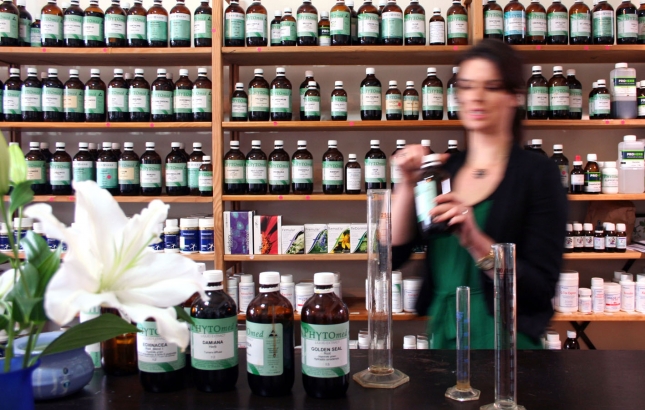
Herbal Medicines and Surgery/Anaesthesia
Having a General Anaesthetic for surgery can be a very overwhelming experience. For most of us the operating room is an entirely foreign place (unless you work in one like me) and even the pre-anaesthetic/pre-surgical clinic can be an unsettling experience with strange and unfamiliar words and concepts.
Having a General Anaesthetic for surgery can be a very overwhelming experience. For most of us the operating room is an entirely foreign place (unless you work in one like me) and even the pre-anaesthetic/pre-surgical clinic can be an unsettling experience with strange and unfamiliar words and concepts.
Recent posts by Dr Morgan Kelly Edwards
Never is the gap between allopathic and alternative medicine so striking as when considering anaesthetic options like epidurals, endotracheal tubes and being asked about which medications you take on a regular basis. However, it is more important than ever to remember the large homogeny between the two branches of medicine in the pre and post surgery period (this is referred to as the ‘peri-operative’ period, meaning the period of time extending from when the patient goes into the hospital, clinic, or doctor's office for surgery until the time the patient is discharged home).
I always ensure I talk to my patients about all of the medications that they take, and I hope that by arming you with a bit of information you can be actively involved in ensuring your surgical journey is as safe as it can be for you. I have compiled a list of common herbal medicines that potentially interact in some way with the anaesthetic you may have. By no means is this a comprehensive list, and I would always encourage you to discuss all medications you take with your doctor.
Echinacea – Improves the immune system by altering cytokine signaling. It is used in the prevention and treatment of bacterial, viral and fungal infections especially in the upper respiratory tract. It is important that any patient undergoing an organ transplant avoid Echinacea due to its effect on the immune system. Furthermore, long term Echinacea use can sometimes lead to liver dysfunction and should therefore be avoided in combination with hepatotoxic drugs such as methotrexate, amiodarone and halthone.
Garlic – Used to help treat diabetes, cardiovascular disease and even tumours. The mechanism of garlic’s action is likely due to the amino acid cysteine, which inhibits platelet aggregation (the clumping together of platelets in the blood) and increases bleeding tendency in the peri-operative period. This is especially important in patients who are also on aspirin, and non-steroidal anti-inflammatories (NSAIDs e.g. nurofen, voltaren). I advise patients to avoid Garlic for at least 7 days before surgery.
Ginger – Used as an anti-emetic (to prevent nausea and vomiting) and an anti-inflammatory for a range of conditions. Ginger directly stimulates the gastrointestinal tract. It also is a potent inhibitor of an enzyme called thromboxane synthetase which results in a prolonged bleeding time. It is very important that the use of ginger is discussed with your doctor, especially if you take aspirin or warfarin.
Gingko biloba – Used as a free-radical scavenger to protect nerve cells and vascular walls, and to improve blood flow to tissues. Gingko biloba is also used for the treatment of Dementia and is a potent inhibitor of platelet activation and should be avoided in patients who take warfarin, aspirin or NSAIDs. Current data suggests discontinuing use for 36 hours prior to surgery.
Ginseng – Used to help with mood enhancement, immunomodulation and aphrodisiac effects. Some studies have found tremor and mania when ginseng is taken together with monoamine oxidase inhibitors (antidepressants such as moclobemide) and thus this combination should be avoided. In the peri-operative period, elements of ginseng’s activity that are important include its hypoglycemic activity and its interference with platelet aggregation. Your doctor needs to be aware of the need for blood sugar monitoring, and due to the risk of bleeding, ginseng should be avoided in conjunction with aspirin and NSAIDs. Studies indicate that ginseng should be avoided at least 7 days prior to surgery.
Kava – Used for its sedative and anxiety relieving effects. Kava works in a similar way to benzodiazepines such as Diazepam (Valium) and therefore the two should be avoided in combination. Benzodiazepines are a part of many general anaesthetics and it’s important your anaesthetist knows if you have been taking Kava recently. It is a good idea to stop Kava 24 hours prior to surgery.
St John’s Wort – Used for its anti-depressive effects. St Johns Wort works in a similar fashion to many other antidepressants – by inhibition of noradrenaline, serotonin and dopamine reuptake. Like with other antidepressants, it is important to avoid the risk of a serious condition called serotonin syndrome intra-operatively, and thus your anaesthetist must know if you take it. Furthermore, St Johns Wort induces some of the major liver enzymes involved in drug metabolism, meaning that their metabolism is greatly increased, and their effect reduced. This is especially important with warfarin, and agents used in anaesthetics such as alfentanil, lidocaine and midazolam. It is advisable to stop St John’s Wort at least 5 days prior to surgery.




It's not my first time to pay a visit this site, i am visiting this web site dailly and get fastidious facts from here all the time.
Hi Reenek, I'm glad that you are enjoying the content on the site! We're so lucky to have the likes of Dr Morgan Kelly Edwards sharing some of their knowledge with us!
<a href="http://generic-viagrapills.com/#1279">GenericViagraPills</a> viagra buy china http://generic-viagrapills.com/#0782 ukraine order viagra <a href=http://generic-viagrapills.com/#2382>cheap viagra</a> best viagra price <a href="http://viagrabestellen-apotheke.com/#3682">viagra bestellen</a> viagra kaufen ohne rezept http://viagrabestellen-apotheke.com/#6402 viagra erfahrungsberichte <a href=http://viagrabestellen-apotheke.com/#2305>viagra generika gefahrlich</a> viagra und speed
http://acheterviagra-pharmacie.com/#3767 viagra prix en belgique <a href=http://acheterviagra-pharmacie.com/#6516>www.acheterviagra-pharmacie.com... pharmacie viagra acheter cialis http://buysildenafil-pharmacy.com/#6407 buy viagra in singapore discount online <a href=http://buysildenafil-pharmacy.com/#3414>Buy Sildenafil Pharmacy</a> where to buy generic viagra
http://generic-viagrapills.com/#1868 weight loss buy viagra <a href=http://generic-viagrapills.com/#1120>Generic Viagra Pills</a> vanzare buy viagra